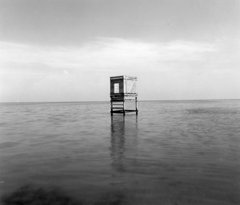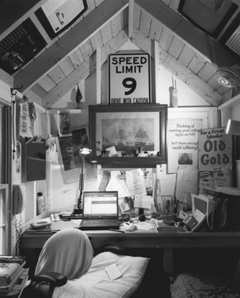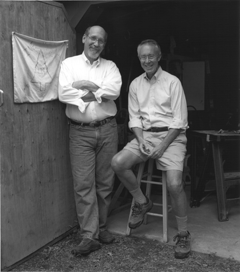The Man Cave
Air Date: Week of May 5, 2006

Duck Blind, North Carolina (Ken Ross)
The workshop, the tool shed, the hunting lodge and the Lazy Boy have one thing in common. Author James Twitchell says they are all places where men go to get away. Host Steve Curwood talks with Twitchell about his new book, packed with photographs, "Where Men Hide."
Transcript
CURWOOD: It’s Living on Earth. I’m Steve Curwood.
Okay. What do the hunting camp, the barbershop, the recliner and the remote control all have in common? Well, according to author Jim Twitchell, they’re all artifacts of a disappearing space – the places where men go to hide.
Professor Twitchell, who teaches advertising at the University of Florida, has been exploring the idea of what he calls “man caves” - the last places where men can go and be, well, men. He joins me now to talk about his new book, “Where Men Hide,” which features photographs of favorite male haunts.
Jim, hello!
TWITCHELL: Hi, how are you?

Duck Blind, North Carolina (Ken Ross)
TWITCHELL: When I looked at Ken’s photographs for the first time, I thought to myself, ‘boy these are the grimiest places.’ I think to some degree the places men go are the places women don’t feel comfortable. And so he feels ‘okay, this is a place I’m protected. ‘
CURWOOD: Guys hide?
TWITCHELL: I think guys hide at least in a different way from women. Women seem to be happy to separate. To go off with other women or with children. But men seem much more circumspect. It’s much more an event when men get together to do whatever it is that they’re going to do together. Whether it’s make war, or play sports, or just separate.
CURWOOD: Where would they go?
TWITCHELL: Well, in the first part of the twentieth century--I was amazed by this statistic--that the average middle class working man would spend up to four hours a week in the company of other men at his lodge. Whether he was a mason, or a moose, or an elk, or an eagle. He worked all day with other men and then when he had a chance in his free time, he went right back to that group except now not to work but to fraternize.
CURWOOD: And so those fraternal organizations went away and what, were replaced by college fraternities?
TWITCHELL: Well, certainly they went to college fraternities. But even college fraternities really are nowhere near as vibrant today as they were even a generation ago. In fact, really, many of these places that men used to go now have evaporated.
CURWOOD: Okay, so where can us guys go to get away?
TWITCHELL: Well, one of the places we go is into the car. Especially at the beginning of the SUV, almost invariably the ads had blackened windows, a guy getting in, maybe with one other guy. And they’re just taking off. In fact, my favorite was, I think, for an Isuzu where the guy actually hears the disembodied voice of God saying ‘go farther, go farther (laughs).’ He goes into the woods, deeper and deeper. And then finally in the last scene we see him on a raft heading for a waterfall and the disembodied voice says, ‘oh too far.’
CURWOOD: Now, you even explore the crawl space where Saddam Hussein was found. You seem rather nostalgic in your ride through of this.
TWITCHELL: (laughs) You know, it’s terrible but I think Saddam had it pretty close to the ideal. He goes down into this little hiding hole and he waits for the storm to pass. And then he had his upstairs house, too, where it was a terrible mess, but you could see that he had been cooking stuff. He had a copy of Dostoevsky, he had a book on the interpretation of dreams. So, he had his upstairs life. And then when the Earth starts to rumble and the bombs start to fall, up goes the little trap door and down he goes like a mole.
Interesting because men hide when they have a chance to downstairs. All these opium dens and all these gambling caves, and speakeasies, we always imagine you walk downstairs below the ground to get to them. I think that’s kind of the male place to go to pull the curtains.
CURWOOD: Yeah Jim, I gotta ask you about this. You put in your book a picture of your own little office, tucked away at your summer camp. I gotta say this really looks like the picture of adolescent rebellion. I don’t know how old you are. But I’m looking at, let’s see, an ad for cigarettes, there’s way too much junk on the desk to really get anything done. The bedding that you have in there looks like it would not be terribly comfortable. And it just really has a ratty tattered look to the thing.

Jim’s Hidey-Hole (Ken Ross)
CURWOOD: In your book, in fact, you donate a little prose as well as the picture to this and I’d like you to read from the point where you say that men particularly like your office.
TWITCHELL: Okay.
I know that this space is special to men. Not only do I entertain the occasional passersby who tell me how nifty it is. But whenever I go to the big box stores like Lowes or Home Depot I note those little pre-fab sheds in front getting smaller and smaller, like Russian dolls. These sheds are supposed to be for tools, but I suspect that they are also so the man of the house can find a house he really can be man of. The small ones are rectangular. The large ones look like quanson huts. They often come with a door and little windows. Just like a child’s play house. Sometimes they are done in the style of a log cabin. In ads they are invariably populated by men.

Author James Twitchell and Photographer Ken Ross (Donald Standing)
TWITCHELL: (laughs) Well, you go and take a look. But my suspicions are it’s space the guy is looking at because he knows that it will be his space. All other space in the house and even in the garage is up for grabs. It used to be that a man had a cellar, that’s where his tools were. Or he had a garage that’s where his car and engine was. But now we’ve lost the cellar, and very often the garage. Well, he can’t work on the car, the car is much too complicated. So, maybe these little sheds out in the corner of his life is where he goes for respite.
CURWOOD: Jim Twitchell is professor of English and advertising at the University of Florida. His new book is “Where Men Hide.” Jim, thanks for coming out of hiding.
TWITCHELL: It was my pleasure.
Links
Living on Earth wants to hear from you!
Living on Earth
62 Calef Highway, Suite 212
Lee, NH 03861
Telephone: 617-287-4121
E-mail: comments@loe.org
Newsletter [Click here]
Donate to Living on Earth!
Living on Earth is an independent media program and relies entirely on contributions from listeners and institutions supporting public service. Please donate now to preserve an independent environmental voice.
NewsletterLiving on Earth offers a weekly delivery of the show's rundown to your mailbox. Sign up for our newsletter today!
 Sailors For The Sea: Be the change you want to sea.
Sailors For The Sea: Be the change you want to sea.
 The Grantham Foundation for the Protection of the Environment: Committed to protecting and improving the health of the global environment.
The Grantham Foundation for the Protection of the Environment: Committed to protecting and improving the health of the global environment.
 Contribute to Living on Earth and receive, as our gift to you, an archival print of one of Mark Seth Lender's extraordinary wildlife photographs. Follow the link to see Mark's current collection of photographs.
Contribute to Living on Earth and receive, as our gift to you, an archival print of one of Mark Seth Lender's extraordinary wildlife photographs. Follow the link to see Mark's current collection of photographs.
 Buy a signed copy of Mark Seth Lender's book Smeagull the Seagull & support Living on Earth
Buy a signed copy of Mark Seth Lender's book Smeagull the Seagull & support Living on Earth

